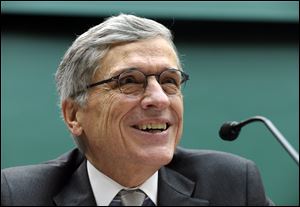
FEATURED EDITORIAL
Long-distance call
Federal regulators should be in no hurry to allow air travelers to use their mobile phones during flights
12/16/2013
Wheeler
Other than perhaps a screaming baby, someone carrying on a loud and obnoxious cell-phone conversation might be the last person you’d want to sit next to on an airplane. The prospect that the federal government will permit passengers to use mobile phones during flights isn’t ready to take off, at least for now.
The Federal Communications Commission has banned cell-phone use on planes since 1991, because of the danger of interference with communications networks on the ground. Advocates claim technology has eliminated the problem.
So last week, FCC members voted 3-2 to start the process of authorizing airlines to allow passengers to use mobile wireless devices above an altitude of 10,000 feet. The commission is now taking public comment on the proposal.
But the Federal Aviation Administration, which regulates air safety, isn’t so sure. Transportation Secretary Anthony Foxx, whose department oversees the FAA, said he is looking at banning voice calls on flights. Bills that would outlaw cell-phone conversations on planes are before both houses of Congress.
FCC officials acknowledge they have been inundated by negative feedback since the agency began considering the proposal. Suggestions range from mandating a cone of silence on airplanes to making passengers step outside to use their phones.
FCC Chairman Tom Wheeler notes that even if his agency approves cell-phone use, the Transportation Department and airlines themselves could overrule the proposal. Airlines should be asking their customers now what they think about the idea.
Intense price competition in recent years has caused U.S. airlines to reduce services and comfort. Air travel, considered a luxury decades ago, is now too often the stressful equivalent of sitting in a flying intercity bus.
Being forced to eavesdrop unintentionally on others’ phone conversations could complete the circle of misery. The last time the FCC proposed lifting the ban, beginning in 2004, it reversed itself three years later.
A poll of 1,000 adults conducted last month by YouGov/Huffington Post, concluded that half of the respondents oppose voice calls on planes, while fewer than one-third favor allowing them.
The Association of Flight Attendants union is among the most vociferous critics of voice cell-phone calls. Spokesman Corey Caldwell calls the interior of an airplane “the last remaining quiet zone.”
Attendants, whose safety-first role has not changed since they were first employed in 1935, would find it increasingly difficult to mediate disagreements about cell conversations while fulfilling their other duties, she says.
One compromise would ban cell-phone conversations but allow passengers to send text messages and surf the Internet while they are aloft. That proposal still might permit terrorists to coordinate a real-time air attack.
The issue requires a lot more study, of both its safety implications and its impact on all passengers. The FCC should be in no hurry to change its rules.